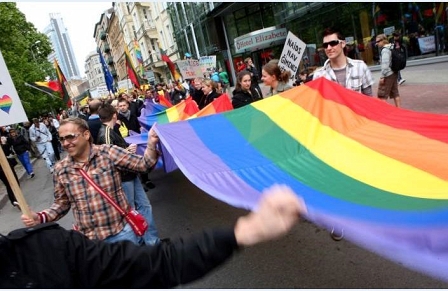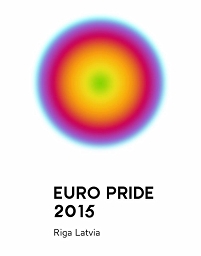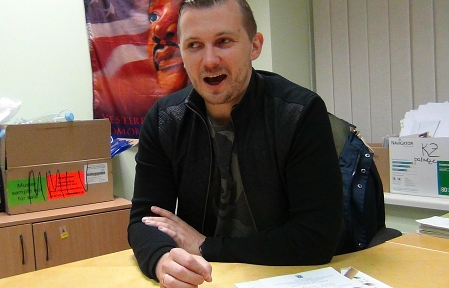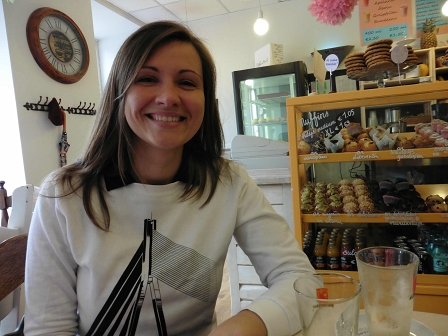Erstellt am: 15. 6. 2015 - 10:32 Uhr
A Front Line For Gay Rights
EuroPride, Europe’s most prestigious gay pride event, kicks off in Latvia’s capital Riga today, marking the first time that the festival of diversity and tolerance will be held in a former Soviet state.
"This is a front line," says Kaspars Zalitis, the co-chair of the event, "so if you come you are helping to make history."
It's a week-long party designed to challenge and combat prejudice. "Be The Change! Make History! Making History Is Hot!" is the slogan of the event.
Over the next week there will be lectures, exhibitions and a film festival, the event's centerpiece will be a parade through Riga's streets on June 20.

EuroPrideRiga
Why is it a front line? Well Latvia has notoriously struggled with the concept of "live and let live" in recent years. A gay pride event was notoriously pelted with bags of human excrement in 2006 and this year's Europride event has been threatened by a anti-gay group calling themselves the Anti-Globalists who have tried, unsuccessfully, to use legal loopholes to try to stop the event taking place. The group says it is defending "traditional values" and trying to "protect the family."
"This is going to be a space where we are going to shout out loud that we need equality for LGTB People, not just here in Latvia, not just in the Baltics but in the whole region," says Zalitis.

EuroPrideRiga
The proximity of the host city to Russia has symbolic significance. In 2013, Moscow adopted a law banning any person from saying anything positive about the LGBT community in the presence of minors. Homophobic attacks have been on the rise there and Russian media, eagerly consumed by Latvia's Russian-speaking minority has been criticized in the West for an alleged homophobic undertone.
"So many things are happening for the first time. This is an absolutely crucial time. This is exactly the right time to host this event here."
But being a front line doesn’t meant that attending the event will be dangerous says Zalitis, who fronts a LGBT rights group called Mozaika, although it might seem scary at first: "You will certainly see people who don't like the LGBT community."
But Zalitis says that intense cooperation with the police should guarantee a "fun" event. "There will surely be protests against EuroPride," he says. Indeed hundreds are expected to turn out. Zalitis says the right to peacefully protest is part of the freedom of expression that he holds dear.
It is ominous however that organizers have suggested that supporters of the Pride event shouldn't openly wear emblems of tolerance, such as rainbow-adorned badges, if out after dark.

Chris Cummins
Yet Kaspars Zalitis argues that these worries make the event particularly worthwhile – a timely political statement and not just a party. Because there is still a lot of work to be done in Latvia to convince people of the need to accept LGBT rights, Riga is a meaningful choice of destination.
A victory for LGTB rights is a victory for human rights
The Europride organizers are keen to present the event as an event for everybody. Zalitis, who has a large poster of Martin Luther King Junior in his office, insists his struggle is not to promote the interests of one particular interest group but as part of the broader human struggle for fundamental acceptance of the need to live together in diversity. A victory for LGTB rights is a victory for human rights. If you are human, that means it is a victory for you.
Latvia is just coming to the end of its stint at the revolving presidency of the Council of the European Union - it's a chance to end that term with a statement that they will protect fundamental values of human rights and democracy.

Chris Cummins
Many Latvians are upset that their widely shared footage of the 2006 protests has led to a national image of sexual intolerance. Regardless of their own sexuality many in Riga see the chance to host Europride as a chance to reset that identity and make a statement about the direction in which their country should be travelling.
"Who we want to love is a private issue"
In a café not far from Mozaika's offices, I meet Eva Ikstene Strapcane, a young TV anchor whose face appears on many of the EuroPride 2015 posters. She describes herself as a "heterosexual and a Christian" and says she is supporting the event because she finds it absurd that anyone is discriminated against on the basis of their sexuality: "Who we want to love is a private issue. We have to respect people."
Zalitis says that this year, marking 25 years since the redeclaration of Latvian Independence, is a perfect date for a reset of values. "25 years after the fall of the Iron Curtain it is exactly the right time to say that whatever happens human rights will win in the end. That's why we say 'Changing History Is Hot'."


